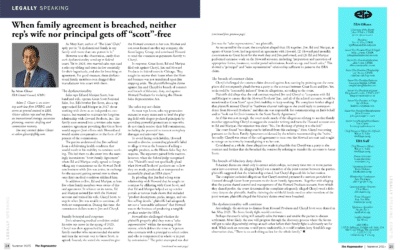This fall, Kate Walsh, formerly of “Grey’s Anatomy” and “Private Practice,” premieres as the Honorable Rebecca Wright in the NBC sitcom, “Bad Judge.”
Like Walsh’s previous characters, Judge Wright looks to be a somewhat salacious and bawdy professional, this time dispensing criminal justice rather than medical care.
The show’s promotional clips feature a prosecutor summoned to the bench who defends his questioning as “protocol.” An ill‐tempered and hung‐over Wright responds, “Yeah? Are tight pants part of your protocol, too?”
The show’s title, premise and tagline — “Upholding the rules by day. Breaking them by night.” — appear ripped from real‐life headlines. Judge Rebecca Wright, meet Judge Wade McCree of Wayne County, Mich.
In April 2012, a court bailiff’s husband complained to Michigan’s Judicial Tenure Commission when he found a photo of McCree’s bare chest on his wife’s cellphone.
“Hot dog, yep that’s me,” crowed McCree when Fox News interviewed him in a video that went viral. “I’ve got no shame in my game.”
Perhaps not, but the Michigan Supreme Court ultimately censured him for bringing shame to the profession.
While the investigation was pending, Robert King appeared before McCree on a felony charge of failure to pay child support. He eventually agreed to a delayed sentence, with a stipulated payment plan. It was during a May 2012 pretrial hearing that the married judge met the custodial parent, King’s ex‐wife, Geniene La’Shay Mott.
As the prosecutor prepared the child support agreement, McCree turned to Mott and told her, “Ma’am, you’ve been so patient all day, and, you know, having all this time with my deputy here, let me get a little of it.” As McCree later testified, “I confess she was an attractive, striking woman and, you know, she caught my eye.”
Soon McCree started texting Mott: “Girl, every man in the damn courtroom was peeping your upscale game.” Also: “C’mon, U’r talking about the ‘docket from hell,’ filled w/tatted up, overweight, half‐ass English speaking, gap tooth skank hoes … and then you walk in.”
The JTC investigated McCree again over the relationship, which quickly heated up, and when the judge answered its complaint, sometimes writing in the third person, he admitted making “the unfortunate decision to engage in a sexual relationship with [Mott] and also admits that on a few occasions, the relationship took place in his chambers.”
He sought discretion from Mott, “obviously [making] these requests because he was concerned about his wife and family discovering their relationship,” and later e‐mailed her: “My Judicial Tenure Commission matter has me nervous, as you might expect.”
In his JTC testimony, McCree said Mott “surprised me and thrilled me. … I lusted after that woman. I’m in my middle 50s and she’s a double dozen years my junior.” Although he continued presiding over her ex‐husband’s child support hearing, which he admitted discussing repeatedly with Mott, he denied the relationship affected his decisions or judicial conduct.
McCree admitted texting Mott before an Aug. 16, 2012, hearing about whether King complied with his child support obligations. Mott suggested jail time unless King paid $2,500 in cash, and McCree texted back that, absent compliance by the court date, “he gets jail 2 pay.”
When King showed up $672 short of compliance, claiming assailants robbed him of $2,000 and fatally shot two friends, McCree extended his time until month’s end and placed him on a “tether” that monitored his whereabouts. The judge also told a felony conviction might be imposed if he failed to pay.
After that hearing, McCree finally decided to transfer King’s case to another courtroom. Rather than disclose the personal relationship, he told the assistant attorney general and the chief judge the transfer was due to his son attending a social event with Mott’s son. He then texted Mott: “DONE DEAL!!!:‐) I told a story so well, I had me believing it!!”
In response to the JTC’s investigation, McCree admitted that his failure to recuse himself from King’s case was “misconduct in office.” Additionally, the Michigan Supreme Court found that when McCree’s relationship with Mott later soured, he “sought to employ the prosecutor attorney’s office as leverage against her by concocting charges of stalking and extortion.” Following the JTC’s recommendation, the court removed McCree from the bench in March. In re Judge McCree, 845 N.W.2d 458, 476 (Mich. 2014).
Upon learning of the judge’s sexual relationship with his ex, who dragged him into criminal court, King filed suit against McCree. On top of losing his job (and being assessed $11,645.17 in JTC costs), McCree now faced liability under the Civil Rights Act, 42 U.S.C. Section 1983, for allegedly violating King’s due process rights.
As egregious as the conduct at issue was, the federal district court in Detroit dismissed King’s suit based on judicial immunity. On appeal, the 6th U.S. Circuit Court of Appeals — where McCree’s late father once served —traced the doctrine of judicial immunity back to the days of Lincoln, and affirmed in an unpublished opinion. King v. McCree, No. 13‐2033 (6th Cir. Jul. 21).
The court noted “judicial immunity is immunity not just from the ultimate assessment of damages but is immunity from suit itself.” Only two exceptions to the doctrine lie, including for “non‐judicial actions, i.e., actions not taken in the judge’s judicial capacity.” Mireles v. Waco, 502 U.S. 9, 11 (1991).
The 6th Circuit determined that very few of McCree’s challenged actions affected King, and those that did —the acceptance of King’s plea, entering the delayed‐sentence agreement, extending the time to pay the child support obligation while “tethering” King and then transferring the case — were all legitimate “judicial actions.”
The plea and delayed‐sentence agreement were entered before McCree’s affair began, and the other acts were functions normally performed by a judge and were done in McCree’s official capacity — i.e., in a courtroom, on the record and with King’s counsel present. Even if the judge had acted maliciously, that would not strip him of immunity.
Even so, the court openly questioned “whether judges should receive judicial immunity for all judicial acts,” but believed immunity was required “under existing Supreme Court law.”
With that, the bona fide “bad judge” avoided any civil liability for presiding in a criminal action while engaged in what the 6th Circuit called “often reprehensible” actions.



